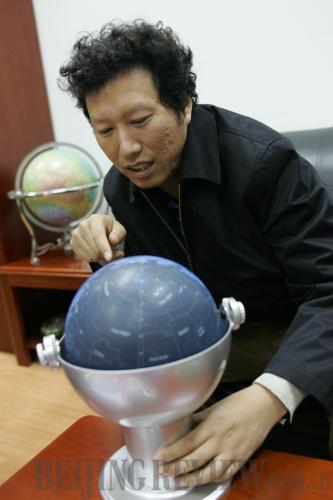|
 |
|
Zhu Jin, Deputy Director of the Beijing UFO Research Society and also Curator of the Beijing Planetarium (CFP) |
Xu Dingming, Director of BURS, said the society has adhered to correct methods in its UFO study and resisted non-scientific views and practices.
Zhou Xudong, Deputy Secretary General of BURS, said it was a process of eliminating false data and retaining the verifiable. "The greatest value of UFO study is the promotion of the exploration of the unknown with an open mind," he said.
For decades, because of the curiosity of many about unexplained phenomena, China's private sector UFO research has been vigorous and an effective observation network is emerging.
Chinese UFO researchers and fans are now working on several main topics, including causes and possible underlying patterns of UFOs, case studies on ancient and modern UFO events in China, connections between ancient Oriental philosophy and modern natural science, formation of ball lightning and fireballs, theories of subluminal and superluminal motion and dynamics, microbiology and aerospace engineering.
Scientific methods
Besides research, BURS members have also been engaged in science popularization. What they want most to get across to the general public is that supposed UFOs or sightings do not necessarily mean alien spacecraft. "In the 100 cases this year, none was thought to be an alien flying saucer," said Zhou Xiaoqiang. What they have done was mostly to give scientific explanations of the UFO phenomena people had discovered.
"UFOs refer to unknown flying objects in the sky, not only alien spacecraft," he said. These unknown objects may be natural phenomena such as clouds, stars, ball lightning or mirages; or manmade objects such as airplanes, spacecraft, satellites, rockets, kites and balloons; or some unusual images caused by electronic equipment such as cameras and radar; or optical illusions caused by people's subjective consciousness. Sightings may even be insects.
During the evening of March 21, 2008, a mysterious glowing object suddenly appeared in the air in front of the gate of the 1,700-year-old Tanzhe Temple in Beijing. The object was floating in the air and happened to be captured by surveillance camera. Strangely, nothing was found when gatekeepers went out to check.
The BURS experts were invited to conduct an investigation. Before long, Zhou Xiaoqiang surmised that the object was likely a spider. To prove his surmise, he and his colleagues, together with a cameraman with China Central Television, have been to the temple four times to conduct experiments and successfully managed to reproduce the UFO scene in the surveillance cameras with a spider hanging on its web as the leading actor in the scene.
Zhu Jin, Deputy Director of BURS, who is also Curator of the Beijing Planetarium, thinks UFO research has not yet become a real science. It does not need a great deal of reasoning to explain most UFO phenomena. Most UFO cases can be explained through experience, particularly those eventually shown to be planes or kites. It does not need the help of advanced science and technology.
"Many UFO events can be repeated," Zhu said. For example, he explained, if a person takes a picture of a light source, a light point will appear in the symmetrical position of the light source in the photo, looking like a flying saucer. But in fact it is only because of the glass reflection inside the camera.
But BURS members firmly believe that intelligent life does exist beyond the Earth. They think aliens are too far away from us, maybe about 100 light-years. "Although there are about 200 billion stars in the Milky Way galaxy, the average distance between two of them is nearly 20 light-years, which means if we send a signal from the Earth, we would get a reply at least 40 years later," Zhu said.
An antenna with the diameter of 500-meter has been established in Guizhou Province, with the aim of finding extraterrestrial life. "We believe that the most likely way to find aliens is through wireless signals," Zhu said. | 